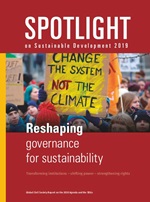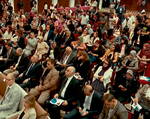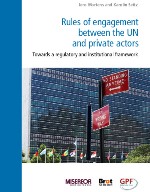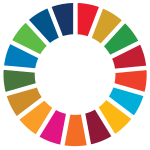Social Watch news
Published on Wed, 2019-10-09 10:04
Women's and feminist organizations are increasingly involved in economic issues and are actively participating in global resistances that challenge the implications of financialization, the concentration of wealth, the rise of inequality and the increasing power of corporations, argues Corina Rodríguez Enríquez, from Development Alternatives with Women for a New Era (DAWN) in a chapter of the recently launched Spotlight report. The advance of the women's agenda, as well as many years of advocacy work, has also permeated the agendas of multilateral institutions and the spaces of the multi-stakeholder global governance. However, both the approach that these institutions have on ‘gender issues’, as well as the space that they allow for the articulation of women’s voices are controversial and limited. |
Published on Mon, 2019-10-07 12:13
For the first time since 2003, Baghdad hosted last August a regional conference on gender issues, co-organized by the government, civil society and UN agencies. The Forum discussed the role of the various institutional mechanisms for women operating in the Arab region and promoted the establishment of an independent national body for women's empowerment in Iraq. Reporting on the debate, the Iraqi Al-Amal association concludes that ‘effective institutional mechanisms are required to confront the challenges that hinder women's rights in the Arab region, especially during and after conflicts, and to confront the Israeli occupation, terrorism, extremism, religious radicalism, patriarchal mentality, tribal norms and corruption, and policies of exclusion and marginalization of qualified and active women in decision-making positions.’ |
Published on Mon, 2019-10-07 11:29
Global multi-stakeholder partnerships and initiatives between public and private actors, which move beyond traditional nation-state multilateralism, are now perceived as the future of international cooperation. The UN is already involved in hundreds of partnership initiatives with individual companies and business associations. ‘Rules of engagement between the UN and private actors,’ a paper by Jens Martens and Karolin Seit from Global Policy Forum, demonstrates that the existing guidelines are weak and highly heterogeneous. Effective and comprehensive rules for such cooperation are still missing. The non-regulated engagement between the UN and the private sector could result in a loss of reputation, increased influence by private actors on political decision-making, and could divert scarce public resources away from UN goals. |
Published on Tue, 2019-10-01 10:28
Last week, the UN General Assembly 74th Session’s first full week in New York City met amid High-level meetings on climate, health, the SDGs, financing for development, and Small Island Developing States. Over 90 Heads of State or Government convened at UN Headquarters for this political moment, described by the outgoing President of the General Assembly, María Fernanda Espinosa Garcés as “inextricably linked strands of DNA that make up our ‘blueprint’ for the world”. Integral to this year’s session has been the heightened participation of corporate, philanthropic and financial actors in both the official, High-level meetings themselves and a variety of concurrent meetings including the SDG Business Forum, the World Economic Forum’s Sustainable Development Impact Summit, UN Global Compact events, the Bloomberg Global Business Forum and the Bill and Melinda Gates Foundation Goalkeepers event. |
Published on Thu, 2019-09-26 11:44
UN High-level Dialogue on Financing for Development – 26 Sept Civil society groups call for urgent reforms to combat illicit financial flows, abolish tax havens, introduce a global wealth tax and an intergovernmental body on tax cooperation. New York, 26 September: The High-level Dialogue on Financing for Development which follows the SDG Summit, must urgently find ways to access the funds governments need to achieve the SDGs, say members of the Reflection Group*. “The 2030 Agenda cites the enormous disparities of opportunity, wealth and power as one of the immense challenges to sustainable development. And yet governments are not doing nearly enough to tackle these challenges, despite a plethora of robust policy proposals emanating from civil society, academics and others”, say Kate Donald from the Center for Economic and Social Rights and Jens Martens from the Global Policy Forum. |
Published on Wed, 2019-09-25 17:25
The so-called ‘Climate Action Summit’ was an odd affair. It began with a youth dialogue, including a speech from Greta Thunberg, who called out the audience of heads of state and CEOs of some of the companies known for their inaction in the face of the climate emergency. “How dare you say it is business as usual”, “We are in the beginning of a mass extinction and all you can talk about is money and fairy tales of eternal economic growth, how dare you”, she said. This public telling off was greeted with tumultuous applause – perhaps showing that it was going to be business as usual after all. |
Published on Wed, 2019-09-25 14:02
UN SDG Summit: 24-25 September The need for gender equality is being referred to throughout discussions on the SDGs as an important prerequisite to achieving the goals 25 September New York: “There is simply no way we can achieve the 17 SDGs without achieving gender equality and empowering women and girls”. Who said this? A feminist polemicist? No, United Nations Secretary-General Antonio Guterres pointing out that gender equality is the thread running through the 2030 Agenda. |
Published on Tue, 2019-09-24 13:29
SDG Summit: 24-25 September 2019 SDG 9: Build resilient infrastructure, promote inclusive and sustainable industrialisation and foster innovation 24 September, New York: “Public infrastructure is the bedrock of our societies: it helps families thrive, and allows communities and businesses to grow”, says David Boys, from global trade union federation Public Services International. For this reason it is impossible to build a resilient infrastructure, an aspect of SDG 9, without a firm foundation of human rights and universal access to quality public services, says David Boys, writing in Spotlight 2019*, published by the Civil Society Reflection Group, which analyses annual progress on the 17 SDGs. |
Published on Mon, 2019-09-23 13:02
Global UN Watchdog warns that while big donors bridge the gap in WHO funding they are also shaping health programmes according to business norms, and marginalising public health programmes. The writers suggest measures to reinstate the WHO at the centre of Universal Health Coverage. When the Global Health Summit opens on Monday, its morning session will focus on using the campaign for Universal Health Coverage as a driver of the Sustainable Development Goal 3: Ensuring healthy lives. |
Published on Fri, 2019-09-20 10:34
Will world leaders at the Climate Summit match the courage of the school students who strike around the world against the climate emergency, or will they be put to shame? 20 September, New York: Will the tone of Monday’s UN Climate Summit pale in contrast with the courage of striking students who are taking a day off school in 120 countries, to march for action to confront the climate emergency, though many know they could face severe penalties? |
SUSCRIBE TO OUR NEWSLETTER











